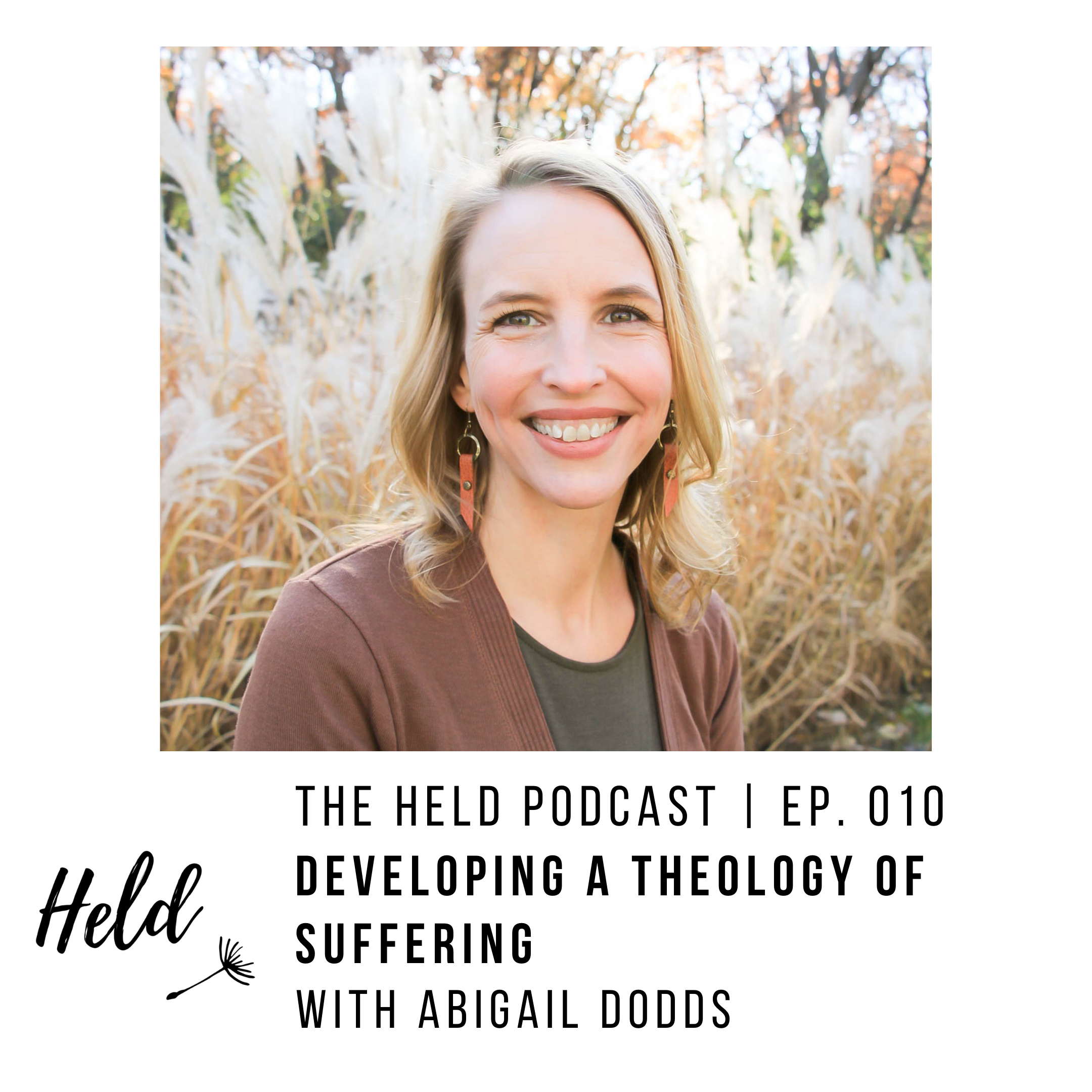Ep. 010 | Developing a Theology of Suffering with Abigail Dodds
In this episode of the Held Podcast, I chatted with Abigail Dodds about the importance of developing a theology of suffering. We talked about what a theology of suffering is, how to develop one, and walked through some common thoughts and reactions to miscarriage that cause us to doubt God’s goodness in the face of our suffering. What we believe about God shapes our experience of suffering, I hope this episode will be a true help in helping you to reconcile your hard experience with a good and sovereign God.
About Abigail:
Abigail Dodds is wife to Tom and mom to five great kids. She is a Regular Contributor at Desiring God, the author of '(A)Typical Woman' (Crossway 2019), an M.A. student at Bethlehem College and Seminary, a baking enthusiast, garden fanatic, and mediocre knitter. She writes at hopeandstay.com and on instagram @abigail__dodds .
Questions in this Episode:
Would you start off by just telling us a bit about your own experience with miscarriage personally?
Today’s episode is entitled “Developing a Theology of Suffering.” Can you explain for us what this means, and why it’s so important to have?
I know that your miscarriage led to a much longer season of hardship. Can you tell us a bit about that and perhaps use that experience as an example to show us how what we believe about God and know about his word shapes our experience of suffering? How did that season challenge or shape what you believed about God? Or maybe how did what you believed about God impact your experience of that season of suffering?
I received a message recently from a woman who has miscarried who said that that was the first time she had had to deal with “senseless suffering” personally… and by that she meant, a situation in which there was no one or nothing to blame but… well, God. The intensely personal experience of experiencing death within your own body can raise a lot of theological questions, it definitely did for me! Let’s think for a moment from the perspective of a listener who felt like they had a solid understanding of suffering but is suddenly feeling totally stumped by the problem of evil. If God is good, and in control, how can I reconcile the presence of evil, sickness, and death with his character?! What wisdom do you have for us here?
What are some practical ways that we can develop a theology of suffering even in the midst of it?
Maybe you could help us apply the truth to these real scenarios I have read online…
a. “I feel like God is taunting me, pregnant women and big families everywhere, even at church…”
b. I know God is trying to teach me something, but what is there left to learn? I mean really, four miscarriages?! Can we move on to another trial?!
c. For a women for whom the process is taking forever or is having a season of suffering after loss that won’t let up… perhaps she’s saying “I’ve heard the expression “refiners fire” but I feel like I have been forgotten in the kiln, maybe God is punishing me for something.”
d. I’ve done everything I’m supposed to do! I waited until I was married to have sex, we were prayerful about when to start trying, we have served God and attended church and worked with the youth group! What more could he want from us?! How are these teen girls and drug addicts that don’t even want their kids getting pregnant when I’m not?
e. “It’s been a week since they told me the baby’s heart had stopped. I’m still throwing up, still have this bad taste in my mouth, still so exhausted and having food aversions… The baby is dead, the least God could do is take away these symptoms!”
Questions for every guest:
What’s one way God has used your experience of miscarriage to work in your heart and life?
If you could encourage a woman to meditate on or memorize any verse or short set of verses in this season, what would it be and why?
Noteworthy Quotes:
“When the miscarriage happened, I had all my theology ducks in a row. I knew what I believed about who God was— his goodness, his sovereignty— and I had all the boxes checked I knew were from his word. There was nothing lacking in that in a truly sinful or negative way. I had been well taught. And I believed what I was taught from the word. But as the scriptures talk about so often we are tested at times. And so what happens is those beliefs that are in one sense theoretical can’t remain theoretical anymore. And that’s what happened with my miscarriage was it was kind of that first ‘I’m an adult, something bad has happened’ that really impacted me personally.”
“Theology is just our knowledge of God. And so a theology of Suffering would just be trying to understand what we know about God as it relates to our suffering. What does suffering mean when we believe certain things to be true about God’s character. Is there a way to reconcile suffering with what we believe about the character of God? And so those are usually the types of things people are trying to sort through and work through, hopefully biblically, when they talk about developing a theology of suffering: What do we believe about God in relation to our suffering? It’s often in regards to suffering that we can’t relate to our own sin.”
“Adam sinned. Sin entered the world through the one man, Adam. So if you zoom out, if you step back, sin still is the cause in some ways of the evil and the sickness and the death that we see in the world. There is a futility, a groaning, that has worked itself into creation that we can say is the result of sin. Not our specific sin that led to this miscarriage, but sin in general. And I think that’s a helpful thing to realize and recognize. It’s helpful because it allows us to grieve, and it also allows us to hate sin as we ought to, even original sin that has now gotten into everything in a way.”
“God is in control. We serve a sovereign God who is completely in control of everything that happens. And if I stopped at “Oh, sin cause what happened.” And if I didn’t move past that or join with it that “no, that was God’s plan. He planned it before the foundation of the world, he is sovereign over it,’ and as a Christian we get to add ‘And I know and trust that there is good in it.’ And the best place I can take us to see this is the cross. Here you have Jesus, Gods own son, who is receiving the greatest evil. And yet at the same time we can read in Isaiah that it was the will of God to crush him. I don’t know what to do with that. These are high thoughts. We don’t go around sort of glibbly trying to reconcile them or easily fit them together in a puzzle, but what we do is we stand back and we look at this all powerful God who planned that reality of the cross, the reality of the greatest ‘senseless’ suffering to ever happen to happen to his Son, who did no wrong who was never deserving of anything bad to happen to him, and he worked the greatest possible of all possible goods for it—for his people.”
“What was really helpful to me was to be given very small bite sized pieces of truth that I could affirm and that weren’t too overwhelming.”
“[We must] guard against making someone else’s blessing our trial.”
“Certainly God is teaching us, there is no doubt about it that he is teaching us through our trials, but not in that kind of a transactional way where if we just do X then he’ll finally give us the thing we want. A Christian’s deepest want is him. And so, we don’t use God to get the thing we want, the thing we want is God. What’s potent is that he gives us himself in the trials.”
“What is there left to learn? There’s left to learn the heart of God for you. [Even] if the trials don’t let up, he is for you in the trials!”
“God is so much better than what you can use him for. He, himself, is the gift.”
“We have a sense that there is a way things ought to be and when it doesn’t go that way we can feel the futility and even that is a sign of God’s purposes and plans because they will one day be as they ought.”
“Go to the cross again and just keep looking to the proof, the absolutely irrefutable proof that God is for you. And the only way that you can keep reminding yourself of that reality, He’s for you, He’s for you, He’s for you, is looking at the cross because the scriptures tell us that this is love. Keep reminding yourself of what love actually is.”
“He has used [miscarriage] to help me trust his goodness and his ways more.”
Scripture References:
The Book of Job
Psalm 145
Romans 5
The Book of Ecclesiastes
Psalm 131
Romans 8
Intro/ Outro Music:
My Soul Will Wait (Psalm 62) [feat. Stacy Lantz], Hilton Head Presbyterian Church
“Held” Book Purchasing Info:
purchasing link (discount code: heldpodcast10 )
(or order from amazon)


